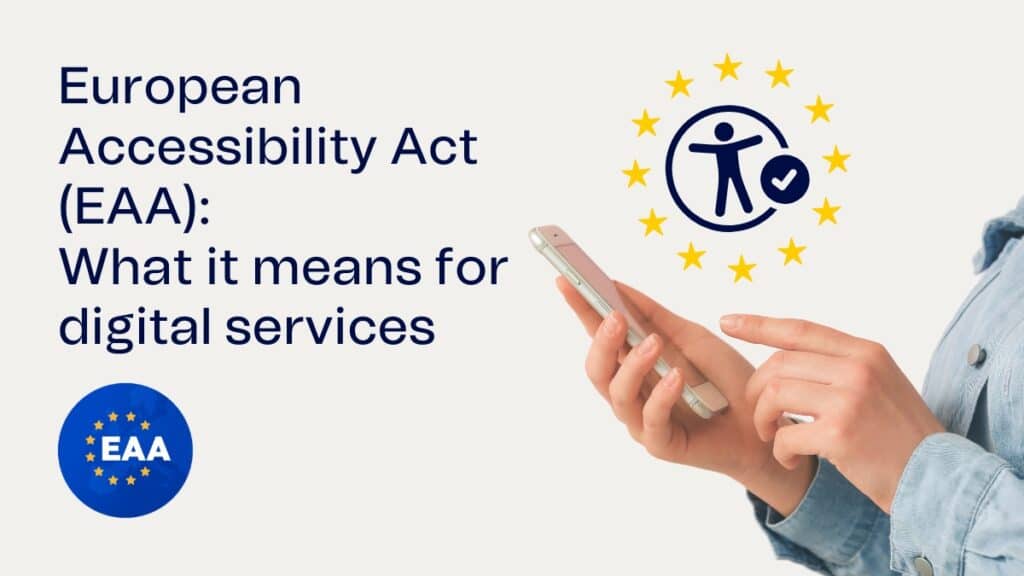Starting June 28, 2025, the Get ready for the European Accessibility Act (EAA): Veridas helps you deliver accessible, compliant identity verification across all digital journeys. (EAA) will be enforceable across the European Union. This regulation sets a clear and unified framework to ensure that digital products and services are accessible by default and inclusive by design.
If your organization offers digital services in the EU — whether in banking, e-commerce, travel, telecommunications, or identity verification — understanding how the EAA applies to your operations is not optional. Failing to comply may result in fines, restrictions on market access, or damage to your brand reputation.
But beyond the risks, the EAA offers a strategic opportunity to create more inclusive and trusted digital experiences.
At Veridas, we believe that accessibility is not a checkbox — it’s a core principle of digital trust. We’ve been working proactively to ensure that our identity verification technologies help organizations like yours align with this new legal and ethical standard.
Whether you’re a current Veridas customer or simply starting to evaluate the impact of the EAA, this guide answers the most common questions about the regulation and how to begin preparing — especially in the often-overlooked area of inclusive identity verification.
What Is the European Accessibility Act (EAA) and Who Does It Affect?
The European Accessibility Act is a directive aimed at removing barriers to digital access for people with disabilities. It mandates that key products and services — both in the public and private sectors — must be accessible to everyone.
The EAA applies to any organization offering services in the EU, with particular focus on sectors such as e-commerce, banking, transportation, telecommunications, and digital identity. This means that many businesses operating online will be required to audit and adapt their digital platforms to ensure compliance.
Which Digital Services Must Comply with the EU Accessibility Act?
The EAA covers digital services that involve user interaction or digital transactions. This includes websites, mobile apps, e-readers, ticketing machines, customer service interfaces, and more.
Platforms that support online payments, identification, or communication — including identity verification solutions — are specifically mentioned in the regulation. Even if your organization only operates online, you are still subject to these rules if you serve users in the EU.
Key Deadlines: When Does the European Accessibility Act Come into Force?
The first major deadline is June 28, 2025. From this date onward, all new digital products and services placed on the EU market must meet accessibility standards defined by the EAA.
If you already have services in operation, the law allows a transition period until June 30, 2030. However, any significant modification made before that date will require your platform to comply immediately — so planning ahead is critical
Digital Accessibility Requirements under the European Accessibility Act
To align with the EAA, services must cater to users with a variety of needs. This includes using accessible design elements like sufficient contrast, adaptable font sizes, intuitive layouts, keyboard-friendly navigation, and support for screen readers.
The requirements are closely aligned with the Web Content Accessibility Guidelines (WCAG) — the global benchmark for accessible digital design. Your teams should use WCAG as a foundation when reviewing or redesigning digital journeys.
What Are Companies’ Obligations Under the EAA?
Companies are responsible for ensuring that their digital platforms meet accessibility standards — regardless of whether they build them in-house or rely on third-party providers. This means conducting accessibility audits, updating design systems, and training teams accordingly.
A proactive approach not only helps avoid legal issues but also results in better products. Accessible platforms are more usable for all users, easier to maintain, and aligned with growing user expectations around inclusion and transparency.
How to Adapt Your Digital Platforms and Products for the European Accessibility Act
Adapting to the EAA requires a comprehensive strategy. Begin by reviewing key user journeys — such as login, account creation, and purchasing — to identify accessibility barriers and prioritize updates.
Identity verification often plays a critical role in onboarding and secure access, yet is commonly overlooked in accessibility planning. Inclusive verification means offering alternatives to manual data input, supporting assistive technologies, and ensuring flows are intuitive and guided.
Fines and Consequences for Non-Compliance with the European Accessibility Act
Penalties for non-compliance vary by member state but may include monetary fines, public warnings or restrictions on selling services within the European Market.
Beyond legal consequences, failing to meet accessibility standards can alienate users, damage your brand reputation, and reduce customer trust
Step-by-Step Guide to Prepare Your Digital Services for the EU Accessibility Act
Start by assigning internal ownership of accessibility. Conduct an internal audit to identify gaps and prioritize updates to high-impact areas like onboarding, payments, and authentication.
Choose technology partners that share your commitment to inclusion. Involve users with disabilities in usability testing and maintain detailed documentation of your efforts — this demonstrates good faith and readiness if ever challenged.
Which Sectors Are Most Impacted by the European Accessibility Act?
Sectors with heavy digital customer interaction will be most impacted. This includes:
- Finance: online banking, digital onboarding.
- Retail: e-commerce platforms, checkout system.
- Transport: digital ticketing, self-check-in systems.
- Public services: healthcare portals, government sites.
In all these cases, ensuring accessibility across the entire digital journey — not just in marketing or informational pages — will be key to compliance.
Accessible Identity Verification: The Importance of Inclusion in Digital Services
At Veridas, we believe accessibility is fundamental to digital trust. Our Veridas CORE solution is built to support inclusive identity verification experiences that meet EAA requirements. It offers biometric options that work for users with a variety of abilities, is compatible with assistive tech, and simplifies the verification process without requiring manual data input.
Whether you’re already using Veridas or just beginning to plan for the EAA, we’re here to help.
Ready to Make Your Digital Services Accessible?
The European Accessibility Act is not just a legal obligation—it’s an opportunity to build more inclusive, trustworthy digital experiences.
Whether you’re just getting started or already taking steps toward compliance, Veridas can help you make accessibility a competitive advantage.
Contact us to learn how our technology supports EAA compliance and inclusive identity verification.






